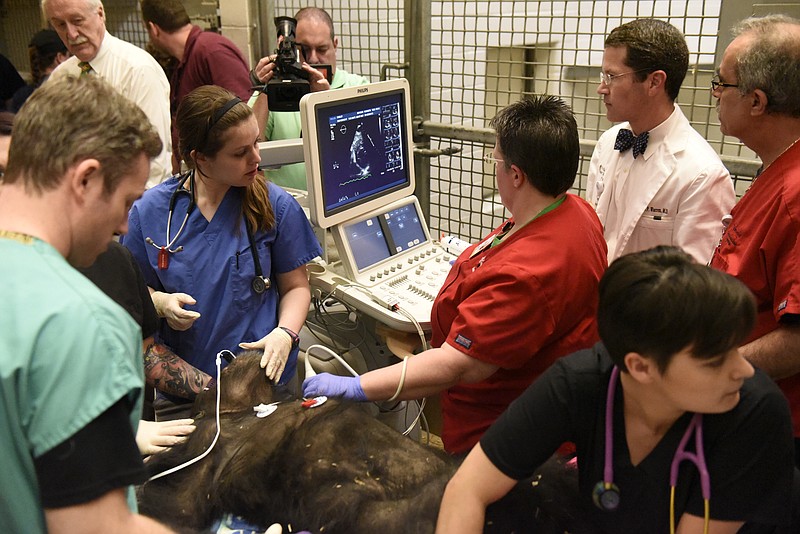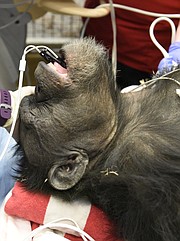It's about 10 minutes into the procedure when, unexpectedly, the patient begins to stir.
"Her eyelids are fluttering," a medical technician announces.
"Give her some gas," comes the response, and a mask is extended over the patient's nose.
But then the 30-year-old female turns on her side and begins heaving.
"Watch your shoes," someone yells.
But it's a false alarm.
Apparently, Shirley, the chimpanzee on the examining table in a side room in the chimpanzee enclosure at the Chattanooga Zoo, only has gas in her stomach.
"She has been slow in the morning, so we're checking for diabetes," said Andrew Cushing, a faculty member at the University of Tennessee's College of Veterinary Medicine in Knoxville. "We'll do a complete physical."
Methodically, the dozen or so zoo medical staffers and UT veterinary school students and faculty work over Shirley's inert form, taking blood, checking her blood pressure and, most importantly, using a portable echocardiogram device to check out her heart.
To one side, CHI Memorial cardiologist Dr. William Warren scans the ultrasound image. A chimp's heart is very similar to a human's, Warren said.
"If you showed me an image, I wouldn't be able to tell you whether it was from a human or a chimp."
But Thursday's examination is not just a practice session for the zoo staff and veterinary students. Heart disease is the most common medical problem for chimpanzees, orangutans and gorillas kept in zoos, and the Chattanooga Zoo animals are part of an international effort to check the heart conditions of every ape in captivity and then compare their rates of heart disease with those in the wild.
The data collected Thursday on Shirley will be included in the Great Ape Heart Project, which is managed by Zoo Atlanta.
"Heart disease is the No. 1 cause of death of chimpanzees, orangutans and gorillas living in captivity," said Dr. Anthony Ashley, veterinarian at the Chattanooga Zoo.
The researchers hope to determine whether the heart disease in zoo animals is because they eat a diet that is too rich and get too little exercise - what one researcher called the "couch potato syndrome" - or whether apes in the wild don't seem to exhibit signs of heart disease because they don't live long enough to develop the problems.
While they don't expect to find problems with Shirley or with Scottie, another chimpanzee examined Thursday, a previous examination did detect heart problems with chimpanzee Hank, who for many years was the zoo's best-known animal before his death in 2011 at age 42.
Shirley and Scottie, along with five other chimpanzees, were donated to the Chattanooga Zoo in 2015 by the Yerkes National Primate Research center in Atlanta.
Contact staff writer Steve Johnson at sjohnson@timesfreepress.com, 423-757-6673, on Twitter @stevejohnsonTFP, or on Facebook, www-facebook.com/noogahealth.com.

